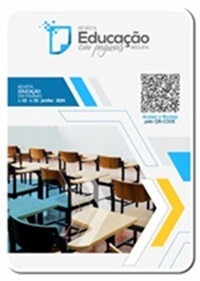Pedagogic strategies that strengthen emotional skills in childhood
DOI:
https://doi.org/10.22481/redupa.v3.15639Keywords:
childhood, emotional skills, pedagogical strategiesAbstract
During childhood, the development of emotional skills depends on various factors present in the educational, family and social context, from which the learning necessary to strengthen the emotional skills of boys and girls is privileged. The objective of the article is to analyze the pedagogical strategies that, when applied in the educational and family environment, strengthen emotional skills in childhood. Based on the qualitative approach and using the literature review method in the categories of pedagogical strategies, childhood and emotional skills, recent scientific documents were analyzed. The results show the importance of knowing and using various pedagogical and didactic strategies to promote learning associated with the recognition and expression of feelings, adaptation to changes, stress management in everyday situations and self-perception.
Downloads
References
ÁGUILA, Clara. Mindfulness e investigación psicológica positivista: Críticas y alternativas. Psychology, Society & Education, 12(1), 2020
ARACENA, Daniela; GONZÁLEZ, Manuel. El estudio experimental de los conceptos de emoción. Revista de Sociología, 36(1), 2021
ASTUDILLO-SARMIENTO, Juan Carlos; CARPIO-TORO, Ingrid Liseth. Práctica de la respiración profunda para el estrés académico en estudiantes de la Universidad Nacional de Educación. Killkana Salud y Bienestar, 4(3), 2020
AYALA, Karla Stefany Valdivia; RAMÍREZ, María Teresa González (2018). Propuesta para mejorar la percepción de la imagen corporal, desde la psicología positiva. Pensamiento Psicológico, 16(1), 119-131 2018.
BAR-ON, Reuven. “Emotional and social intelligence: Insights from the emotional quotient inventory”. En R. Bar-On y J. D. A. Parker (Eds.), Handbook of Emotional Intelligence (pp.363-388). San Francisco: Jossey-Bass. 2000
BISQUERRA, Rafael. Educación emocional y competencias básicas para la vida. Revista de Investigación Educativa, 21(1), 2003
BRU-LUNA, Lidia; M; MARTÍ-VILAR, Mónica; Merino-Soto, Carmen; CERVERA-SANTIAGO, Juan Luis. Emotional Intelligence Measures: A Systematic Review. Healthcare, 9(12), 1696. 2021.
BUITRAGO, David. La emoción y el sentimiento: Más allá de una diferencia de contenido. Digithum: A relational perspective on culture and society, 26, 10. 2020
CHERAGHIAN, Hamid; MORADIAN, Kianoosh; NOURI, Tohid (2023). Structural model of resilience based on parental support: The mediating role of hope and active coping. BMC Psychiatry, 23(1), 260. 2023.
DIDONNA, Fabrizio; SIEGEL, Ronald D; GERMER, Christopher K; OLENDZKI, Alan; TREADWAY, Michael. T; LAZAR, Richard. W; GILBERT, Paul. Manual clínico de MIndfulness (M. C. Jiménez, Trad.). 2011
GIPUZKOAN. Inteligencia emocional: Educación secundaria obrigatoria 12-14 años (Editorial GIPUZKOA). 2021
HERNÁNDEZ, Iris; LAY, Norma; HERRERA, Héctor; RODRÍGUEZ, María. Estrategias pedagógicas para el aprendizaje y desarrollo de competencias investigativas en estudiantes universitarios. Revista de Ciencias Sociales (Ve), XXVII(2), 242-255, 2021.
KAPETANOVIC, Sladana; SKOOG, Tord. The Role of the Family’s Emotional Climate in the Links between Parent-Adolescent Communication and Adolescent Psychosocial Functioning. Research on Child and Adolescent Psychopathology, 49(2), 141-154. 2021.
MCCONNELL, Mark. Emociones en educación: Cómo las emociones, cognición y motivación influyen en el aprendizaje y logro de los estudiantes. Revista Mexicana de Bachillerato a Distancia, 11(21), 2019.
MELAND, Eirik Breidablik, Hans Jorgen; THUEN, Frode. Family factors predicting self-rated health during early adolescence. Scandinavian Journal of Public Health, 49(5), 546-554. 2021
OQUELIS ZAPATA, J. Diagnóstico de inteligencia emocional en estudiantes de educación secundaria [Tesis de masterado, Universidad de Piura]. 2016
PARAMÁ DÍAZ, Amparo. La introspección como herramienta para la didáctica de las ciencias en Educación Superior: Reflexiones sobre la obra de Otero Pedrayo como ejemplo. NUDOS. Sociología, Teoría y Didáctica de la Literatura, 1(2), 21-29. 2017. https://dialnet.unirioja.es/servlet/articulo?codigo=6297249
PĂSĂRELU, Cătălina-Ruxandra; Dobrean, Anca; Florean, Ioana-Simona; Predescu, Eugenia. Parental stress and child mental health: A network analysis of Romanian parents. Current Psychology (New Brunswick, N.j.), 1-13. 2022. https://doi.org/10.1007/s12144-022-03520-1
MAYER, John. D; CARUSO, David; SALOVEY, Peter. “Emotional intelligence meets traditional standards for an intelligence”. Intelligence, 27, 267-298. 1999
MAYER, John. D; CARUSO, David; SALOVEY, Peter. “Emotional intelligence: Theory, findings, and implications”. Psychological Inquiry, 15, 197-215. 2004
SPORZON, Gerson; LÓPEZ-LÓPEZ, Mónica-Cecilia. Evaluación de la inteligencia emocional y la conducta prosocial y su correlación en alumnado de Educación Primaria. Estudios sobre Educación, 40, 51-73. 2021. https://doi.org/10.15581/004.40.51-73
TAPIA, Adrán; Hinojosa Espinosa, Ana María; Muñoz Atiaga, Diana Ruth; Freire, Ortega , Yajaira María. La Arteterapia como herramienta Estimulante para la Actividad Cognitiva en Adultos Mayores. Dominio de las Ciencias, 8(1), 40. 2022. https://dialnet.unirioja.es/servlet/articulo?codigo=8383490
Downloads
Published
How to Cite
Issue
Section
License
Copyright (c) 2024 Revista Educação em Páginas

This work is licensed under a Creative Commons Attribution 4.0 International License.






